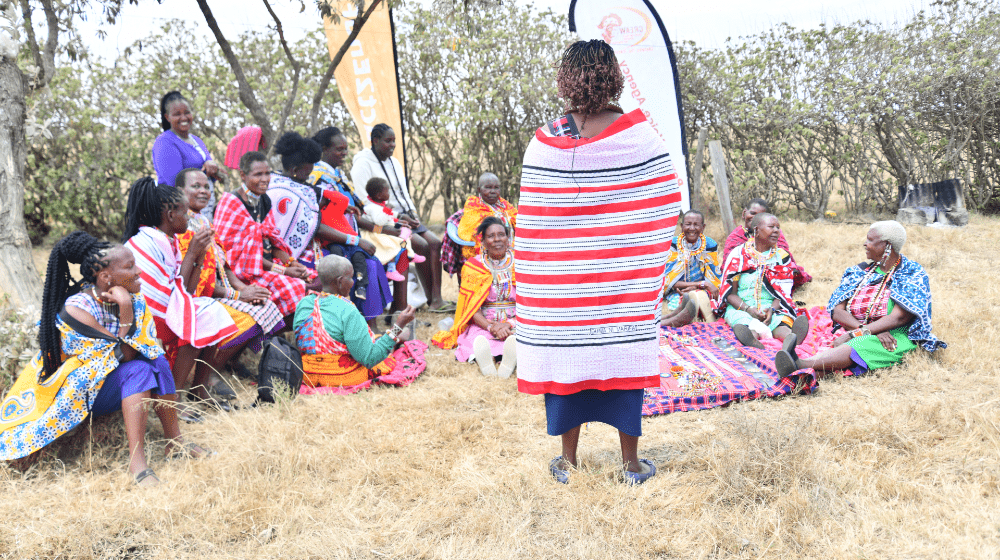Senewa Letuya, a Maasai mother from Narok County, Kenya, conformed to cultural traditions by subjecting her two daughters to FGM in the early 1990s, believing it was essential for their acceptance in society. Having undergone the practice herself at a young age, Senewa later encountered educational initiatives led by the Anti-FGM Board of Kenya in collaboration with UNFPA that highlighted the harmful effects of FGM. This campaign was transformative for her, prompting a shift in her perspective.
In a poignant moment of reconciliation, Senewa sought forgiveness from her adult daughters for subjecting them to FGM. They forgave her, recognizing that she acted out of cultural obligation. This marked the beginning of Senewa's journey as an anti-FGM advocate. She resolved to protect her younger daughters from the cut and committed herself to educating her community about the dangers of FGM.
Senewa's advocacy gained momentum through her involvement with initiatives supported by UNFPA and the Centre for Rights, Education, and Empowerment (CREAW). She received training in awareness creation techniques and access to campaign materials that empowered her voice against harmful practices. Today, Senewa is a community champion who collaborates with local authorities and rescue centers to protect girls at risk of FGM. As a religious leader, she uses her platform to educate her congregation about harmful practices such as FGM, gender-based violence (GBV), and early marriages.
“FGM has no benefits at all. Harmful practices like FGM should end. They cause more harm than good, especially to the girls. We should protect and empower our girls instead of harming them for the greater good of our community,” says Senewa.
Senewa Letuya Njane, a survivor championing against FGM in her community.
Carol Saoli, a former cutter from Polanga, Narok North in Kenya, began cutting girls in 1987. For 28 years, she continued this practice as a livelihood despite government directives on the illegality of FGM. During this time, community awareness about the harmful effects of FGM increased significantly due to government-led initiatives. Saoli’s husband opposed the practice vehemently and encouraged her to quit. Eventually, she decided to stop and was on- boarded by CREAW, a partner organization that is working with UNFPA, as an advocate against FGM. Through training on the harmful effects of FGM and alternative livelihoods such as soap-making and bead-making, Saoli found the strength to move forward and leave her past behind.
Now an advocate, Saoli actively educates families about the effects of FGM while empowering girls to assert their rights. “Times have changed; unlike during our times, girls are getting educated. This has greatly empowered them and helped them become assertive, as they know what is wrong and right. Now girls are saying NO to undergoing FGM,” she asserts.
Carol Saoli, a reformed cutter from Narok County in Kenya.
The partnership between CREAW and UNFPA has significantly increased community awareness and commitment to ending FGM while promoting girl child education and women's empowerment. Women are engaging in economic empowerment initiatives that improve their livelihoods and support their children through table banking, village savings, loans, detergent making for commercial use, beadwork, and small-scale businesses.
Women have become agents of change within their communities by protecting their daughters from FGM and child marriage through reporting mechanisms that liaise with local administration and rescue centers. The program also engages elders through Male Engagement Forums (Olpul), where they meet for sensitization sessions on eliminating FGM and child marriage. These elders share meals and hold community-based declarations supporting an end to these practices. Moreover, intergenerational dialogue sessions with young men advocate for marrying uncut girls, recruiting them as agents of change to prevent new cases of FGM. This male engagement strategy has encouraged elders—custodians of culture—to abandon retrogressive practices like FGM and child marriage in favor of supporting movements aimed at ending these harmful traditions and empowering girls and women. As a result of these collective efforts, there has been a notable reduction in cases of FGM and child marriage within these communities.
Male engagement on ending FGM and community members (Opul) meeting in Narok County.


